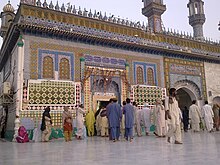Sultan Bahu | |
|---|---|
| سُلطان باہوُ | |
 Shrine of Sultan Bahu | |
| Born | 17 January 1630 |
| Died | 1 March 1691 (aged 61) Jhang, Subah of Lahore, Mughal Empire |
| Resting place | Darbar Sultan Bahu, Garh Maharaja |
| Nationality | Punjabi |
| Citizenship | Mughal Empire |
| Known for | Sufi poetry |
| Successor | Syed Mohammad Abdullah Shah Madni Jilani |
| Parents |
|
| Part of a series on Islam Sufism |
|---|
 |
|
|
Sultan Muhammad Awan,[a] known popularly as Sultān Bāhū[b] (also spelled as Bahoo; Punjabi: [sʊltaːn baːɦuː]; 17 January 1630 – 1 March 1691), was a Punjabi Muslim poet, Sufi, scholar, and historian of the 17th century.[1] Renowned for his mystical poetry, he was active during the reigns of Mughal emperors Shah Jahan and Aurangzeb.[2][3]
Little is known about Bahu's life, other than what is written in a hagiography called Manaqib-i Sultani, which was written by one of Bahu's descendants seven generations after Bahu's own time.[4] According to these records, he was born in Shorkot into the Awan tribe.[5][6] He was son of Bayazid Muhammad, an officer in the Mughal Army, and Rasti.[7] He belonged to Qadiri Sufi order,[6] and started the mystic tradition known as Sarwari Qadiri.[3]
More than forty books on Sufism are attributed to him (mostly written in Persian), largely dealing with specialised aspects of Islam and Islamic mysticism. However, it was his Punjabi poetry which had popular appeal and earned him lasting fame.[4]: 14 His verses are sung in many genres of Sufi music, including qawwali and kafi, and tradition has established a unique style of singing his couplets.[4]: 14
Cite error: There are <ref group=lower-alpha> tags or {{efn}} templates on this page, but the references will not show without a {{reflist|group=lower-alpha}} template or {{notelist}} template (see the help page).
- ^ Kamal Aziz, Khursheed (1993). The Pakistani Historian. Original from the University of Michigan. Vanguard.
- ^ Syed Ahmad Saeed Hamadani. Sultan Bahu Life & Work.
- ^ a b Cite error: The named reference
DTwas invoked but never defined (see the help page). - ^ a b c Sult̤ān Bāhū (1998). Death Before Dying: The Sufi Poems of Sultan Bahu. University of California Press. ISBN 978-0-520-92046-0.
- ^ Kumar, Raj (2008). Encyclopaedia of Untouchables Ancient, Medieval and Modern. Gyan Publishing House. p. 187. ISBN 9788178356648. Retrieved 6 June 2021.
- ^ a b Frembgen, Jürgen Wasim (2006). The Friends of God: Sufi Saints in Islam, Popular Poster Art from Pakistan. Oxford University Press. p. 103. ISBN 9780195470062.
- ^ Sultan Bahu (29 March 2015). Ganj ul Asrar. Translated by Hafiz Hamad Ur Rahman. Sultan ul Faqr Publications. p. 12. ISBN 9789699795213.